- Home
- Kristan Higgins
Always the Last to Know Page 9
Always the Last to Know Read online
Page 9
“Sure.”
I sneaked another look at him. Long lashes on top of that wild beauty. His face had taken on more definition in the past year, and I had to swallow. I wanted to draw that face. Heathcliff. He was Heathcliff of the moors, if I ignored the Ramones T-shirt and gym shorts.
“I should get back,” he said.
“Oh, right. Sure.” My conversation game was red-hot.
“All right if I kiss you?”
I may have twitched. “I . . . What did you say?”
He grinned and half shrugged, so I leaned toward this wild boy, and our lips met, a soft, gentle kiss. The deep scarlet in my heart flared with such heat and beauty, I already loved him.
When the kiss ended, he rested his forehead against mine, his eyes still closed. “Wanna be my girlfriend?” he whispered.
“Okay.”
“You sure?”
“Yes.”
And that was that.
My parents didn’t mind too much; I was that age when kids started dating, and everyone knew the Pelletiers as a good, solid family. Besides, Juliet was pregnant, and our mother was obsessed with throwing her a ridiculous shower (as she’d been obsessed with the wedding two years before). Me having a boyfriend barely registered.
Noah’s parents didn’t mind, either. He was an only child; they loved him and welcomed me, seeing me as a nice girl for their boy, though his mom’s forehead did pucker when I mentioned traveling and applying to schools in San Francisco and Barcelona.
Noah had a job on the weekends; his father was a general contractor, and a lot of his work was expanding houses for the summer people that populated Connecticut’s long, gentle shoreline. He’d worked on Juliet’s house, in fact. Noah would put in long hours most Saturdays and Sundays, not returning till late, when he would come to my house or, if it was super late, to my window, tossing pebbles against the screen until I came out. In these cases, I was Juliet. Juliet Capulet. Or Montague. I always forgot who had which last name.
“Hey, Special,” he’d say softly, and that glowing red would pulse in every molecule of my being. You bet I’d sneak out to be with him . . . to the town green down the block, where we could lie on a blanket and kiss, or, in the off-season, to the dock of one of the summer “cottages,” the waves lapping and lifting us as we fitted together, wrapped so tightly around each other it almost hurt.
In school, his black eyes would rest on me like I was the only person in the world. My friends were jealous; not only was I dating the cutest, nicest boy, but he loved me, and made no secret about it. He loved me. When we were together, everyone else fell to the wayside, and every spare minute was given to each other. It made my friends irritable, but I couldn’t help it. I was smitten. Utterly, completely in love.
For our first Valentine’s Day together, I gave him my first big canvas oil painting—a periwinkle-blue sky just before sunrise, golden clouds tipped with the same color of glowing, lush vermillion that lit up my heart. He hung it in his bedroom and took down all his movie posters and memorabilia so my painting was the only thing on that wall.
Oh, the kissing, the sweaty tangle of young limbs and heated murmurs that painting saw . . .
In our junior and senior years, Noah went to a vocational school part-time, taking a bus to New London on Thursdays and Fridays to learn carpentry, since he loved woodworking as much as I loved painting. I thought we were perfect for each other, both of us artists, though he’d laugh when I said that and say making door frames or coffee tables wasn’t exactly art. Though I’d never thought of myself as unhappy before, being with Noah—so seen, so important . . . it taught me what happiness was.
He had one flaw: he wanted to stay put. He wanted life to be exactly like his parents’ and grandparents’. He wanted to marry me in a few years and raise a bunch of kids, preferably five. (How many teenage boys say they want five kids?) I loved that he saw us together, because I did, too. Just . . . not here. I pictured us traveling, hiking on the moors or walking through the streets of Rome, on the Great Wall, in the spice markets of Mumbai. How we would fund this was unclear, but we were young. We could, er, backpack or however it was that people without rich parents traveled.
But as graduation drew closer, things got a little prickly. Noah had no problem with my plans for the next four years, but there was always a hint of condescension somewhere in there. Like once I’d gotten this “see the world/live in the city” bug out of my system, I’d understand that Stoningham was the only place to be.
But there was no way on earth I wanted to live in the town I’d grown up in. A thousand year-round residents, thick with pretension because of the brushes with celebrity or true wealth—Genevieve London of the handbag empire; an Oscar-winning actress who spent all of two weeks a year in her six-thousand-square-foot house. I didn’t want to run into the same people on the same streets in the same places I’d already been every day of my life. Staying here was an admission of fear of something greater . . . or a total lack of ambition. Only people like Juliet, with her Ivy League degrees and brilliant success, could come back to Stoningham without seeming like a loser. Or so it seemed to me.
I didn’t want to be Barb and John’s daughter and Juliet’s not-as-amazing sister. I didn’t even want to be called “Noah’s girlfriend.” I wanted to be myself . . . with Noah, still my parents’ daughter, but I wanted to be Sadie Frost, yes, that Sadie Frost, the artist.
Change. The word was a siren call that filled me with an energy and thrill I couldn’t describe. When you grow up in Connecticut, you’re defined by the absence of things. We had hills but not mountains. A shoreline, but not really the ocean. Farms, but not exactly farmland. Cities, but either scarred by urban blight or too small to hold their own with Boston and New York just a train ride away.
New York. Oh, New York. All the songs were true. I wanted to be in the hard, glittering city, with its harsh reflections and sharp-toothed skyline, its roar and breath, to meet new people, to not have my family history ambling beside me, to be the only one who defined me. I was eighteen. I ached for it the same way I ached for Noah, with the same molten red longing.
The fact that he had none of this desire baffled me. I thought we were supposed to want these things. Noah did not. He was utterly happy with the idea of waiting me out.
I didn’t hate Stoningham, but God, it was relentless in its familiarity. Every street, every inch of shoreline, every type of weather was something I’d lived over and over and over. The sameness was squeezing the life out of me.
We didn’t make any promises about the future . . . Each of us figured the other would see the light. Their light. I went off to New York, and the first thing I put up in my dorm room was a picture of Noah and me, our arms around each other on the town dock, both of us smiling. His curly hair whipped in the breeze, and my eyes looked more blue because of the sky and water behind us. Breaking up was not in my plans. Ever. We were meant to be. We could find a way where we were both happy and fulfilled. We were different from other high school couples. Our love, I was certain, would last forever.
I was wrong.
CHAPTER TEN
Barb
I never liked my name. I should’ve changed it when I was sixteen.
Barb. Barb Frost. Barbara Marie Johnson Frost. The most boring, unremarkable, midwestern name on every level. Oh, Frost was a fine last name, especially given that John was somehow related to Robert Frost. I’d been so excited by that when we first met. How thrilling, being related to the great poet! To have that gentle, insightful, famous blood running through your veins! Gosh!
“Well, I don’t know about that,” John had said, and maybe I should’ve taken more notice, because it was true. Turned out, there was nothing poetic about him.
At our wedding, his mother told me no one was quite sure how Robert Frost was connected to them . . . It was more of a rumor than anything that could be fact-ch
ecked at the time. Not that it mattered, but it seemed like John had been keeping that from me. Maybe related to Robert Frost is different from being related to Robert Frost. As for the name John, well, it was the most common name in the English-speaking world, wasn’t it? At least no one called him Jack. Jack Frost. Jeez Louise, that would’ve been horrible.
When I finally had a baby, I gave her the most poetic name in the world. Juliet Elizabeth Frost. A beautiful name for a beautiful girl. I only wanted one baby, I’d already decided; I had three sisters and three brothers, and it wasn’t the way they show it in books. I remember reading Cheaper by the Dozen and feeling so cheated. We Johnson kids were no happy gang of seven romping and singing and helping each other, heck no. My oldest brother, fifteen years my senior, barely knew I was alive, and Elaine, older by sixteen months, picked on me endlessly. I was the fifth child, lost in the middle blur. My father never got my name right on the first try, and my mother was exhausted and exasperated all the time. I shared a room with my sisters, and all our clothes were hand-me-downs from our wealthier cousins, first to Nancy, then Elaine, then to me, then to Tina, who at least had the honor of being the baby of the family.
Seven children in nineteen years. Russell, Nancy, Henry, Elaine, me, Arthur and Tina. We weren’t poor, but we weren’t comfortable, either. We didn’t go hungry, but that was because we had a small farm, and Dad could always slaughter a pig. No vacations except for one time when we piled into the gigantic station wagon and drove for ten hours to an aunt’s rented house on a lake, where there was one bathroom for thirteen people. We kids slept on the floors of various rooms and porches, trying to make friends with cousins we had never met. The mosquitoes were relentless, and the lake water was murky and brown. Tina was still wetting the bed at night, which became my responsibility somehow. Every other summer was unbroken, just a stream of long days and hard work, endless laundry and cooking, loading hay, feeding the pigs, weeding our vast garden, crushing grubs between our fingers with no relief from the prairie sun. I hated it.
I was a not-bad student, not that anyone noticed. Solid Bs, the occasional A. I blamed my name. Barbara Marie Johnson. She doesn’t sound much like a valedictorian, does she? Not someone who’d get a scholarship to St. Olaf or Columbia. My oldest brother went into the Army; Nancy went to secretarial school; Henry became a mechanic; Elaine got pregnant and married the summer after she graduated.
All I wanted was to get away. I took a few courses and became a legal secretary, then I applied for jobs up and down the East Coast. No way was I going to stay in Minnesota, no sir. When I got a job offer in Providence, Rhode Island, I took it sight unseen. I had just turned eighteen, since I’d skipped fourth grade, much to Elaine’s annoyance. Without much fanfare, I moved to Rhode Island, so small and charming and eclectic compared to Minnesota!
I loved Providence. It was busy and cultured, with the colleges and the restaurants and such. I told people my name was Barb, which sounded a little more energetic than Barbara. Barbie was out. I couldn’t go by my initials—B. M. or B. J. (A girlfriend told me what BJ stood for, and gosh, I was shocked.) Bobbi was too popular at the time. I tried BeBe, but it didn’t take. Barb was the best I could do.
The law firm that had hired me was large and paid well. I shared a cute apartment with two other girls, and buckled down at being a grown-up, learning to drink a gin and tonic (my family was dry in every sense), painting old furniture I got at garage sales. I learned to accessorize and shop at thrift stores for good-quality clothes and tried to look professional and a little sassy at work. Sometimes people teased me about my accent, which I didn’t even know I had, and I tried to tone it down.
I worked hard at my job, one of dozens of legal secretaries at the firm. I needed to stand out, so I was first in the department every day, last to leave. I learned my boss’s preferences and rhythms, handing him the paper and a coffee just the way he liked it (“You don’t have to do that, Barb!” he’d say every day, pleased that I did). In addition to making sure my work was absolutely immaculate, I put his wedding anniversary and kids’ birthdays on my calendar to remind him. I offered to order flowers for his wife or call restaurants for reservations. I was friendly and respectful and didn’t miss a day.
It worked. He recommended that I get promoted to paralegal, because this was back in the day when you didn’t need to have a degree for that. You just had to be sharp. And I was.
Soon it felt natural, being perky and cheerful and making the most out of my ordinary looks with makeup and flattering hairstyles. Elaine was “the pretty one” in our family, Tina “the feisty one,” Nancy “the smart one.” I didn’t have a title—once, my father called me “the angry one,” and I burst into tears, scaring him. I’m not sure I ever forgave him for that. It should’ve been “the hardworking one.”
I had to work just as hard socially. I didn’t come from a close-knit, adoring family like Becky, one of my roommates. I wasn’t beautiful, like Christine, one of the other secretaries, who made men fall silent and forget what they were saying. I was just Barb Johnson, cheerful, hardworking, helpful. So when it came to parties or dating, I studied the other girls and learned how to flirt, talk, walk with my hips swaying just enough. I was making the best of what I had. That was something I had learned from my parents.
I met John at a company cocktail party. I worked in Real Estate; he worked in Family (one of the lower-earning divisions). But he was nice-looking and had a gentle voice, and he seemed to like me quite a bit, laughing at my jokes, smiling as I spoke. We dated for six months before he proposed, saying he loved me. I loved him, too. I thought I did, anyway. He was a perfectly nice young man with good prospects. I liked kissing him. I liked his hands on me, but I kept things chaste, because who marries the cow if you get the milk for free, even if this was the wild seventies?
That makes me sound cold, doesn’t it? Well, you have to know, there was no romance in my upbringing. My parents married each other because they were both immigrants, both Norwegian, both Lutheran, and my father had land.
John would be a good husband. There was nothing to dislike, no skeletons, no weird fetishes or unkindness. We wanted the same things—stability, family, comfort.
When my parents finally agreed to come to Rhode Island to meet him and his parents, my father opened by saying a big wedding wasn’t in the budget and there was nothing wrong with city hall. John’s parents exchanged a glance. His mother said, “Oh, please, let us throw the kids a wedding. John’s our only child, and we love Barb like a daughter already!”
I felt so pathetically grateful. My own parents didn’t care, but Eleanor Frost did. Our wedding was small but tasteful—forty guests, a fancy lunch at the Hotel Adelade. I invited my siblings, but none of them came. Tina was in a snit because I didn’t want her to be a bridesmaid, Nancy was pregnant and the rest of them didn’t have the money or time or interest to come, frankly. Nancy sent a card and a casserole dish, which, given that she already had four kids, was truly thoughtful.
I stayed at the law firm, relishing both my job and our domesticity. John and I weren’t setting the world on fire, but I read a few books about making a happy marriage, and we were happy, back then. We bought a real cute house on a lovely street in Cranston. On Friday nights, we had cocktails and a nice dinner, just us two, sometimes going out, sometimes me making a fuss and trying something from Mastering the Art of French Cooking, because the books said to make an effort and show your appreciation. On Saturday nights, we went out with friends—bowling or the movies, Mexican food. We had sex on Tuesdays and Fridays, and sometimes on Sunday mornings, too.
I loved being married. The rhythm of it, the safety. When I woke up in the middle of the night, I’d snuggle against John’s back, so grateful to belong.
I loved being a wife. Loved doing little things to make him feel special—cranberry orange muffins on the weekends, or a note tucked into his briefcase.
Maybe m
ore than him, I loved us. The unity of us. He’d roll his eyes in sympathy when I endured my mother’s phone call each month, knowing that she peppered me with a litany of complaints and dissatisfactions. When he called his mother (every other day), I’d run my hand through his hair or give him a kiss on the cheek, glad he was a good son, a good man, then take the phone and update Eleanor on the girlier things in our life—how I’d planted tulips, could I have her recipe for those delicious potatoes with the rosemary and such.
When I was twenty-three, I decided it was time for a baby. Keep in mind I was a midwesterner, and twenty-three in Minnesota was a full-on grown-up, and we’d already been married for more than two years. John agreed. He’d be a wonderful dad, so solid and reliable, so unwavering, especially if our baby was a boy.
As I said, I only wanted one child. Growing up in a sloppy litter of children, I never wanted my child to feel unloved or pushed aside. Though John said he’d been a bit lonely without siblings, he’d also felt completely loved by both parents. He had no idea how lucky he was in that respect.
So it was settled. We had enough in the bank, we had this marriage thing down, and it was time. I repainted the empty bedroom pale yellow and started shopping at antiques stores on the weekends, buying a nice old mantel clock and some porcelain Winnie-the-Pooh figurines that would look so sweet on a bookcase. Threw myself into baking, dreamily imagined my little one running in from the school bus to eat a chocolate chip cookie warm from the oven, chattering about his or her day.
I got pregnant right away. Oh, gosh, we were so happy. We wanted to wait to tell folks, just in case something went wrong, but we celebrated, just the two of us. I think that’s when I loved John the most, and he loved me the most, too. He worshipped my body, in awe, even if I wasn’t showing. My tender breasts, the veins that were suddenly so visible through my pale skin. He’d bring me an Awful Awful from Newport Creamery—a milkshake that got its name from being awful big, awful good.

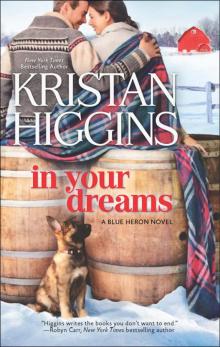 In Your Dreams
In Your Dreams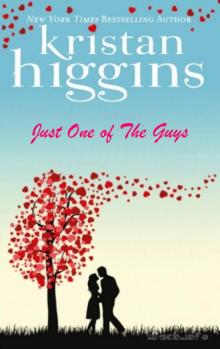 Just One of the Guys
Just One of the Guys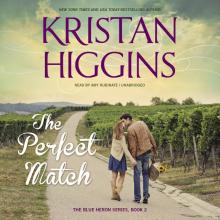 The Perfect Match
The Perfect Match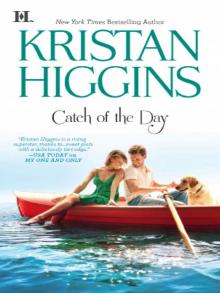 Catch of the Day
Catch of the Day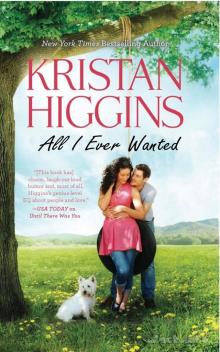 All I Ever Wanted
All I Ever Wanted Until There Was You
Until There Was You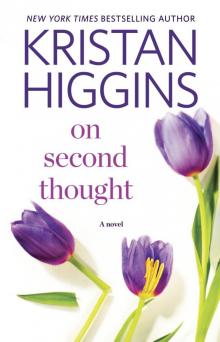 On Second Thought
On Second Thought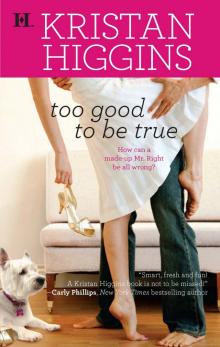 Too Good to Be True
Too Good to Be True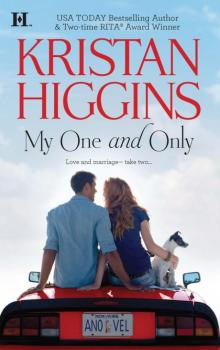 My One and Only
My One and Only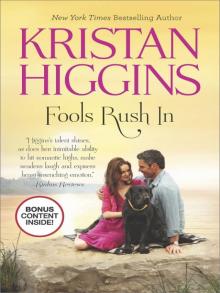 Fools Rush in
Fools Rush in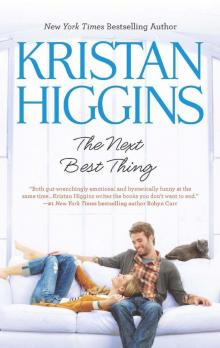 The Next Best Thing
The Next Best Thing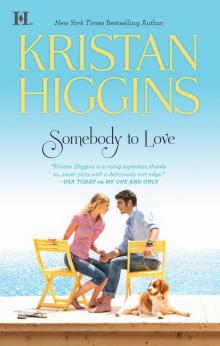 Somebody to Love
Somebody to Love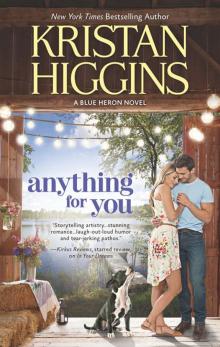 Anything for You
Anything for You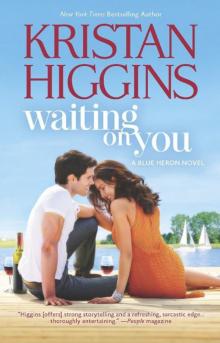 Waiting on You
Waiting on You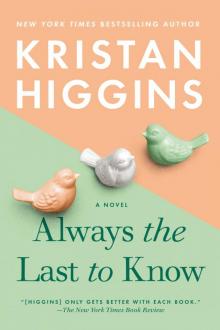 Always the Last to Know
Always the Last to Know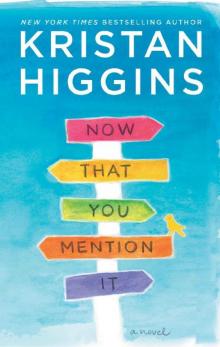 Now That You Mention It
Now That You Mention It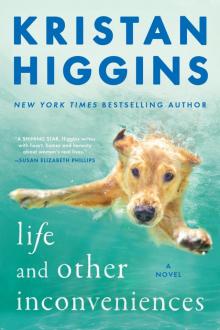 Life and Other Inconveniences
Life and Other Inconveniences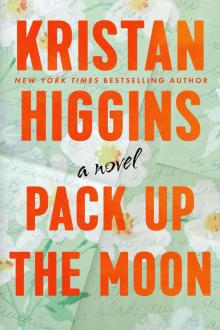 Pack Up the Moon
Pack Up the Moon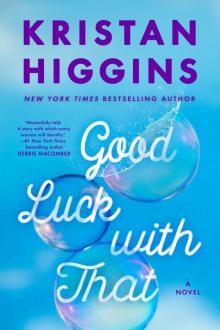 Good Luck with That
Good Luck with That![Blue Heron [2] The Perfect Match Read online](http://i1.bookreadfree.com/i/03/25/blue_heron_2_the_perfect_match_preview.jpg) Blue Heron [2] The Perfect Match
Blue Heron [2] The Perfect Match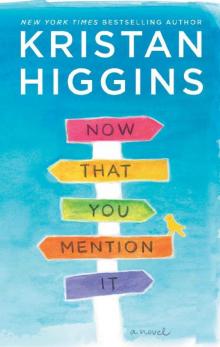 Now That You Mention It: A Novel
Now That You Mention It: A Novel